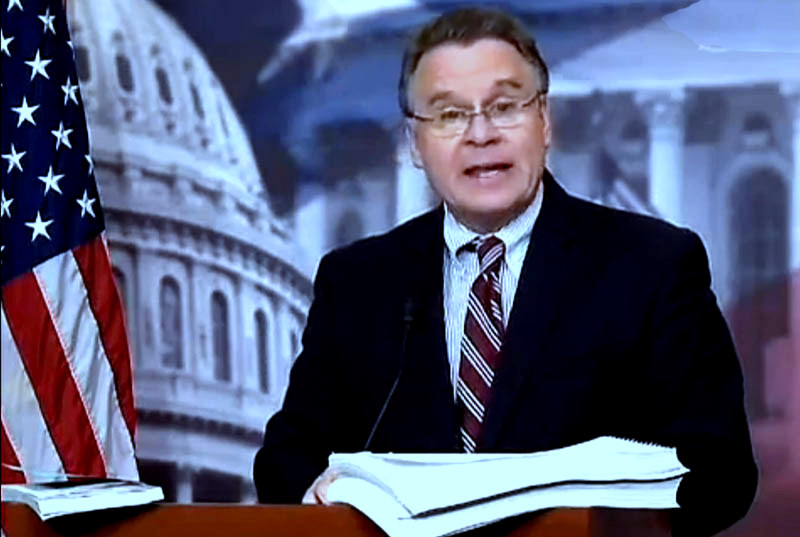 Dharamshala, India: Despite its galloping economy and increasing influence in global affairs, a report released last week paints a grim picture of the underbelly of the world's newest superpower, communist China.
Dharamshala, India: Despite its galloping economy and increasing influence in global affairs, a report released last week paints a grim picture of the underbelly of the world's newest superpower, communist China.
The United States Congressional-Executive Commission on China released its annual report on October 10 monitoring human rights and the development of the rule of law in China. The report documents a disheartening state of affairs inside China where religious intolerance and political persecution persist.
Chairman of the commission and United State's congressman Chris Smith said "China's leaders have actually tightened their grip on Chinese society, and grown more aggressive in disregarding the very laws and international standards that they claim to uphold."
The portrayal of the situation inside Tibet was particularly grim.
THE TIBET-BEIJING DIALOGUE
The report urged the Chinese government to engage in substantive discussions with the Dalai Lama or his representatives on protecting Tibetan culture, language, religion and heritage.
Referring to the stalled dialogue between the Tibetan exiled government and Beijing, the Commission noted that "the Dalai Lama's withdrawal from exiled Tibetan administrative affairs has the potential to alter dialogue dynamics by eliminating the basis for the [Chinese] government and Party to characterise him as a 'political' figure."
However such calls appear to be falling on deaf ears. Attacks on the Dalai Lama in Chinese media and by Chinese government representatives continued during the past year.
China portrays the exiled spiritual leader as "the boss of splittism" and a "double dealer" who, "under the signboard of religion," seeks to
"deceive religious believers' simple feelings" according to Zhang Qingli, Secretary of the Tibet Autonomous Region (TAR) Party Committee.
China considers the Dalai Lama a subversive threat to its control of Tibet, which the Chinese invaded in the 1950s forcing him into exile, and it bans acts of homage to him in Tibet and adjoining areas of China populated by ethnic Tibetans.
RELIGIOUS REPRESSION
Freedom of religious expression has become increasingly reduced and regulated, according to the report. Control over "Tibetan Buddhist
affairs" has been further enforced through Chinese Communist Party policy.
Buddhist monasteries also appear to be suffocating in red tape. As of August this year, the Chinese government and 9 out of 10 Tibetan autonomous prefectural governments had created "regulatory measures" that substantially increase "the state's infringement of freedom of religion in Tibetan Buddhist monasteries and nunneries" the report noted. In one province, regulations had been introduced on "Tibetan Buddhist affairs" to conform with Communist Party objectives. The new regulations impose greater supervision and monitoring of the monasteries.
Other measures require Tibetan Buddhist institutions to:
* Promote patriotism toward China and adhere to socialism;
* Seek government approval for the designation of monks and nuns;
* Conduct classes educating monks and nuns on patriotism
toward China and adapting Tibetan Buddhism to socialism;
* Adhere to government regulations to recognise and approve
trulkus ( reincarnations of lamas);
* Place restrictions on ''religious personnel'' who wish to travel.
China also continued to assert the government's intention to control the selection of the next Dalai Lama. The TAR Party Committee rejected the Dalai Lama's claim that he had sole legitimate authority over his own rebirth. In July 2011, the Dalai Lama rejected Chinese government's intrusion into the matter of Tibetan Buddhist reincarnation as a "disgrace."
TIBETAN CULTURE UNDER THREAT
Cultural expression continues to be severely punished according to the report. Writing essays on ''the situation inside Tibet'', downloading banned songs, and possessing an image of the Dalai Lama were all grounds for arrest or imprisonment.
The use of the Tibetan language, which has already being reduced under Chinese policies, looks to be threatened further. A series of statements by government officials revealed plans "to reduce the status and level of use of Tibetan language during the period from 2010 to 2020."
Government projects have also been announced that many Tibetans believe threaten their culture and identity. Nearly two thirds of the Tibetan rural population -1.43 million farmers and herdsmen - had been moved into new housing, according to the TAR government, to make way for new development projects including a number of railway projects.
Economic development that place government priorities above respecting or protecting the Tibetan culture and environment incited protests and subsequent detentions in many Tibetan regions during 2010-2011.
The report noted that the economic and technological progress in China failed to lead to commensurate gains in the area of human rights and rule of law.
According to the Commission's Political Prisoner Database contained 1,134 records of Tibetan political prisoners detained on or after March 10, 2008. It noted that this figure was "certain to be far from complete." Lack of information and lack of accountability made political prisoners inside China difficult to accurately monitor.
In response to the report, China on Wednesday lashed out at the Commission saying it interfered with China's internal affairs.
"The so-called commission always watches China through colored lens, distorts facts and interferes in China's internal affairs. China is firmly opposed to such moves," said Foreign Ministry spokesperson Jiang Yu. "We urge the commission to stop releasing such kind of reports and stop erroneous acts that interfere with and harm the Sino-US relations."


![Tibet has a rich history as a sovereign nation until the 1950s when it was invaded by China. [Photo: File]](/images/stories/Pics-2024/March/Tibet-Nation-1940s.jpg#joomlaImage://local-images/stories/Pics-2024/March/Tibet-Nation-1940s.jpg?width=1489&height=878)















